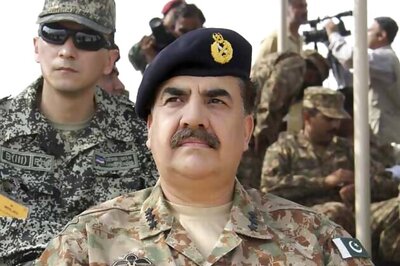
views
Mumbai: After hearing arguments for three months, the Bombay High Court on Monday reserved till February 7 its order on the appeal filed by Pakistani terrorist Ajmal Kasab against the death sentence awarded to him for his role in the 26/11 Mumbai terror attacks.
Justice Ranjana Desai and Justice RV More also reserved order on an appeal filed by the Maharashtra Government challenging the acquittal of LeT suspects Faheem Ansari and Sabauddin Ahmed, who were charged with providing maps of targets to terrorists.
The arguments concluded on Monday after which the judges reserved judgement.
Court room no. 49 on the second floor of the high court building, where the arguments were held from October 18, had turned into a fortress with tight security. Every day sniffer dogs came to look for suspicious objects. Journalists and lawyers were given identity cards and entry was strictly regulated.
For the first time video conference link was put up in the high court for hearing appeals. Cameras were installed in the court to enable Kasab hear the proceedings from the jail.
Kasab had appeared on the screen for a few days initially. On the second day of the hearing he had thrown a tantrum and picked up an argument with jail guards besides spitting at the web camera. He even told the court that he should be sent to America. The court rejected his plea and
warned him to behave.
Government Counsel Ujjwal Nikam justified the death sentence awarded to Kasab, saying he had committed heinous crime by participating in terror strikes in which 166 persons were killed.
During the hearing, Nikam displayed photographs of Kasab and slain terrorist Abu Ismael, which showed them indulging in terror acts in and outside Chhatarapati Shivaji Railway Terminus (CST). The pictures had been clicked by two media photographers. He also showed the court the CCTV footages from cameras installed at CST, showing Kasab and Ismael moving about with rifles.
Nikam argued that the court had erred in partially accepting Kasab's confession before a Magistrate. It had to be accepted in toto and not partially; Kasab's act of retracting his confession in the trial court was an "after-thought" and "well advised", argued Nikam.
Nikam said Faheem had stayed under assumed name of Sahil Pawaskar in South Mumbai where the terror attacks took place. He also sought admission in a computer institute under the same name. Nikam referred to evidence of a witness who said he had seen Faheem giving map to Sabauddin in Nepal.
Faheem's lawyer RB Mokashi denied his client's role in the 26/11 attacks. He said holding forged Pakistani passport did not prove Faheem's role in the attacks. He said the map found in slain terrorist Abu Ismael's pocket (claimed by prosecution as drawn by Faheem) was "planted".
Sabauddin's lawyer Ejaz Naqvi said Sabauddin had not met Faheem in Nepal. The prosecution had produced only one witness to prove that Faheem gave map to Sabauddin but did not provide any corroborative evidence, he argued and said the trial court had rightly given the benefit of doubt to both the accused.
On May 6, the trial court had given capital punishment to Kasab but acquitted Faheem and Sabauddin on the ground that evidence against them was doubtful.




















Comments
0 comment